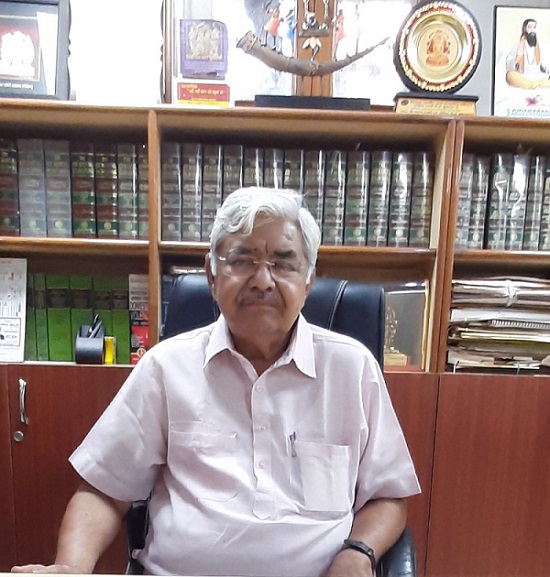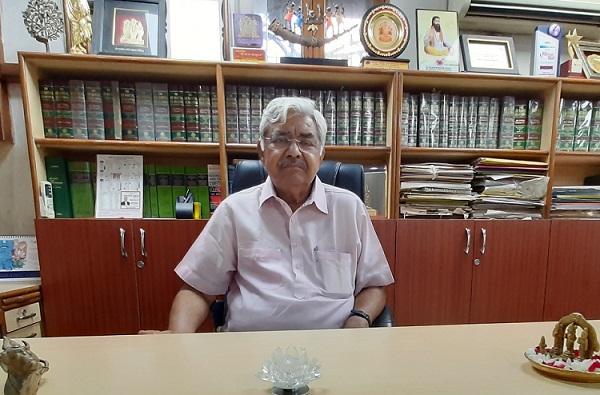Construction of the Shri Ram Janmabhoomi Temple has started at Ayodhya. Alok Kumar, International Working President of the Vishwa Hindu Parishad (VHP) provided latest updates about Shri Ram Janmabhoomi Temple in this conversation with Vivek Sinha, Editor-in-Chief News Intervention. Alok Kumar also explained the gambit behind Halal certifications, and the devious mindset of certain individuals when they mock Hindu Gods and Goddesses in the garb of artistic liberty and freedom of expression.
Vivek Sinha: Welcome to News Intervention. All of us are keen to know about the latest updates on the construction of Shri Ram Janmabhoomi Temple at Ayodhya. Please let us know about the ongoing activities…
Alok Kumar: Well as you know, all obstacles have been removed. We submitted our plans to the Ayodhya Development Authority and they have been sanctioned. We had to pay a hefty fee of Rs 2.11 crore to them, but the plans are in readiness. The soil testing has been completed. The big metal road to take heavy material has been constructed. Larsen & Toubro has set up their site office and we are now at the stage of piling for the foundations, and we hope to complete the construction within three years or a little bit more.
Vivek Sinha: Has the ongoing Coronavirus pandemic hampered the construction activities?
Alok Kumar: Yeah it slowed (initially)…. but then came a stage when we decided not to wait for the Crornavirus pandemic to go away and therefore we decided to start the construction and invited the Prime Minister for it. They said that there must be only 150 guests and we agreed to that. We are building a temple made only of stone. No iron, no cement will be used and the temple would have an estimated life of more than 1000 years. So Corona slowed and obstructed, but our resolve to complete the temple construction in three years from now has overcome the obstacles.
Vivek Sinha: Will the Shri Ram Janmabhoomi Temple at Ayodhya be similar to ancient Indian temples? Is the temple architecture inspired by ancient Indian temples?
Alok Kumar: Of course, yes. Sompura ji who are the architects for the Shri Ram Janmabhoomi Temple were also the architects for the reconstruction of Somnath Temple. They are a family who have been designing and constructing temples for generations so they have a lot of experience in Indian temple architecture and this would be the finest temple.
Vivek Sinha: Let us move on to a different topic, about the Halalonomics—the economics of Halal. The business of Halal is a bit controversial, yet I would like to know your views on this topic…
Alok Kumar: This is not only a bit controversial, rather we have substantial objections to it. This is economic expansionism of Islam. We are for a secular economy. In England there are only 4% Muslims but every restaurant has a board that they serve only Halal meat, and for that you have to take a certification. (Swami) Ramdev ji (Patanjali) has taken that certification, Sri Sri (Ravi Shankar) has taken that certification. That (Halal) certification is given by designated Muslim organisations and they charge a hefty fee for that. So they get enriched for their religious affairs. We pay for that in the form of increased price of the goods and then from the meat they travel to food, medicines, and now a mall is coming up in Gurugram which proclaims that it is Halal certified.
So therefore it is a sort of economic domination of the principles, tenets and people of Islam over the followers of other religions. Somebody told me about a Shabad in Gurbani which ordains them not to eat Halal meat. Halal is rather a very cruel way of killing an animal. Killing an animal to a person like me is bad, but killing the animal with merciless cruelty is the worst. So I am happy that some good people in India have started a campaign to curb Halal meat and to promote Jhatka. The Indians should not yield and the serving of meat should not be restricted to serving only Halal meat including in the Indian Army.
Vivek Sinha: Is the VHP going to take an official stand on it…
Alok Kumar: The VHP as an organisation has taken no stand on it yet, but then all of us are convinced that Halalonomics is bad for the religious amity. And for a secular economy we will join the fight as individuals.
Vivek Sinha: It’s argued that Hindus per se do not have any religious objections to eating Halal meat so why is it that the Hindus are objecting to Halal meat and why is Vishwa Hindu Parishad taking up an aggressive stand against Halal meat?
Alok Kumar: I told you that there is a Shabad in Gurbani against it (Halal). So there are religious objections also and there are objections on the point of cruelty, and three we see it as an organised conspiracy to impose Islamic perceptions and tenets on us. And the money in certification of Halal goes to them. So I see every reason to propagate that there should be no exclusivity in food.
Vivek Sinha: Do you think that a portion of Halal certification money is being diverted towards radical Islamic fundamentalism and also for Islamic terrorism?
Alok Kumar: We do seriously suspect that. Because lots of money is being collected by Islamic organisations which are approved for Halal certification. We do really suspect that the money from those sources may be directed towards Islamic propagation and terrorism.
Vivek Sinha: A few weeks back some people made derogatory comments on Maa Kali. And very often we see people making fun of Hindu Gods and Goddesses…and then taking refuge in freedom in expression. Your comments.
Alok Kumar: We all have heard about Heresy Courts and the Papacy Courts, which are religious courts. And blasphemy laws still exist in Pakistan and other countries. Very recently we heard of an incident where some person had made a derogatory remark about the Prophet in Saudi Arabia and though the family of the person who was killed in the process had pardoned them yet they have been sentenced for life. The blasphemy courts routinely punish people in Pakistan on the charges of speaking against the Prophet or Islam or the Quran.
Recently there was a cartoon against a Hindu Goddess and somebody responded to it with a cartoon on Prophet Mohammed and tens of thousands of people assembled in Bengaluru and they attacked property and people, three persons were killed, the house of the MLA gutted. Can it be a one sided affair? They go on abusing the Hindu Gods and the “secularists” are telling us to be tolerant. And when somebody makes some comment on Mohammad saheb then all those lessons of tolerance go and the person is condemned for inciting hatred. The time has now come for a balanced view. And the balanced view is that I have a right to propagate my religion which includes my right to criticize Christianity and Islam and that right is limited to be within the limits of decency. Those who cross the limits of decency are criminals and should be punished.

Vivek Sinha: I am reminded of a famous painter MF Husain, who painted the nudes of Hindu Goddesses, which was dubbed upon as artistic liberty and freedom of expression. Do you think the paintings come under the ambit of freedom of expression? Where can we draw this line about artistic liberty and freedom of expression?
Alok Kumar: Well, this line should apply to all irrespective of which religion one does belong to. Those paintings were extremely hurtful to the Hindus and I can’t even describe the details of it. And I saw a painting that he (MF Husain) painted of his mother all dressed in sober clothes and looking nice and good. Her mother was well dressed looking down, being humble and in good taste. Do we have the same right towards our Goddesses? Why does he paint them in nudes? And in other vulgar poses? And why is it that Hindus are asked to tolerate it? I am sorry. You may call me a bigot or a communal but we will not tolerate it.
Vivek Sinha: Sure, I get your point. What is next on the agenda of VHP….
Alok Kumar: We will complete the Shri Ram Janmabhoomi Temple. It is paramount. We will put all our resources in the construction of Shri Ram Janmabhoomi Temple. After the Coronavirus pandemic eases we will go to the 400,000 villages across India, organise Ram Poojas, processions, we will go to the houses of 11 crore Hindus, collect funds for the Shri Ram Janmabhoomi Temple and in the process we will try that as the temple rises in Ayodhya a temple rises in every Hindu heart, and every Hindu is reminded that Ram went to Kewat Raj called him a friend. When Kewat referred to himself as being of the so-called “low caste”, Ram responded back and said that he does not believe in the high or low of castes or of mankind. He only knows the relationship of love and devotion. Ram also went to the hut of Shabari so we will bring this social harmony. The annihilation of caste and samrasta of Hindu society will be our priority. Like Ram went to the Ahilya’s Ashram and gave her back her garima, the respect and modesty, we will also do that to every woman in the country.
We shall work for the development of Scheduled Castes and Tribes in social and economic fields and on health issues. We have made an ambitious Setu Yojana where we shall work for taking the benefits of government schemes particularly to the Scheduled Castes and tribes, getting them new skills, establishing them in business and industry not as employees but as masters. We will focus on cow-based agriculture, no chemical fertilizers, pesticides or insecticides. In the coming years we will invest all our efforts to reenergize the Hindu society into a positive vibrant society.
Vivek Sinha: We often hear about temple ruins being found in foreign countries, Indonesia, Cambodia, Pakistan… Is the VHP planning to restore these Hindu temples found in foreign lands?
Alok Kumar: Yes, at least in preserving them. And in a limited way, yes we are doing it. Some temple remains were found in Multan, Pakistan. And we went to the Pakistan High Commission and requested them to hand over the temple remains to the Indian government. So in our little way whatever efforts we can make to preserve such temples we are doing that because these temples belong to the whole mankind. When the Bamiyan Buddha Statues were demolished, it was a loss to mankind. And so I would ask everybody, particularly the Europeans, who are so keen to save the statues of those who had advocated slavery during their time, these temples are world’s heritage and they must be saved and preserved for future generations.

